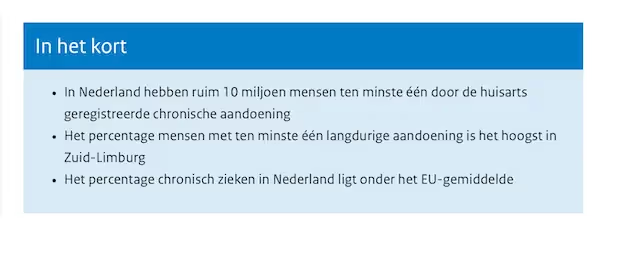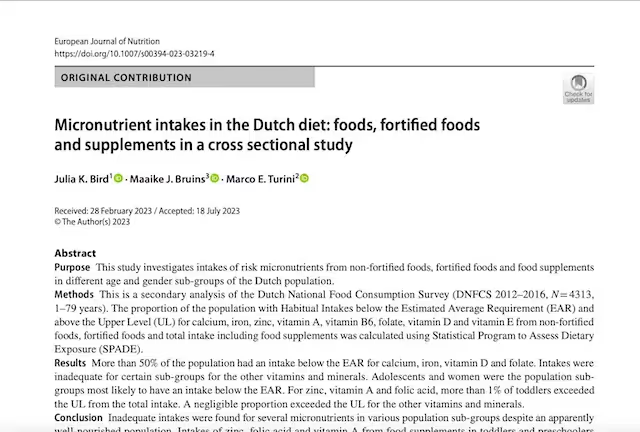
Are dietary supplements dangerous?

Are they really dangerous? Renze Klamer, a Dutch talk show host, claimed that there is a scientific consensus that 98% of people do not need supplements.
In January 2024, Dutch talkshow host Renze Klamer spoke to entrepreneur and health addic Arie Boomsma in his talk show 'Renze' an interesting question: is it necessary to take vitamin and mineral supplements? Renze claimed that there is a “scientific consensus” that 98% of people do not need these supplements. Made a few months earlier Arjen Lubach the entire supplement industry is ridiculous. Food supplements would also be dangerous. And Linda Magazine -a magazine that does not happen to be based on stories about diseases- also takes a look at 'the meaning and nonsense of dietary supplements.
The tenor: you have to pay close attention and none of it is necessary.
But in a society where 60% of the population suffers from chronic diseases and 40% of elderly people in care homes are considered malnourished, the argument for the importance of a healthy diet and the need for nutritional supplements seems stronger than ever. Let us delve deeper into this issue.
On 1 January 2019, the Netherlands faced a shocking health problem: as many as 10 million people, representing 60% of the population, suffered from a chronic illness (https://www.vzinfo.nl/chronische-aandoeniningen-en-multimorbiditeit..
In addition, it is estimated that 40% (!) of Dutch elderly people in homes are malnourished, which in itself is alarming and has attracted the attention of the Malnutrition Knowledge Center. https://www.kenniscentrumondervoeding.nl)


These figures raise the question: is our body sufficiently nourished to offer a good immune system against diseases?
According to some, food does not seem to play as crucial a role as it seems, but history shows otherwise.
Scurvy among sailors? Oh yes, vitamin C.
Rickets? Oh yes, sunlight and vitamin D.
Beriberi? Oh yes, Vitamin B1.
It is clear that our body needs sufficient nutrients to stay healthy, as the Nutrition Center also writes, but what about the current situation?
Hidden risk groups
“A shortage of minerals or trace elements actually no longer occurs in Western society, unless there is unilateral eating habits, long-term illness or chronic use of medication,” says the Nutrition Center. “Eating a variety of food in accordance with the Good Nutrition Guidelines provides enough vitamins, minerals and trace elements for almost everyone. For some groups of the population, this may not be the case. They are advised to use a supplement. This is special advice for babies (vitamin D and K), young children (vitamin D), women who want to become pregnant (folic acid) and during pregnancy (vitamin D and folic acid), elderly people (vitamin D), people with dark or tinted skin or people who do not get outside enough (vitamin D) and people who do not use animal products (vitamin B12).”
The groups that are susceptible to deficiencies in essential nutrients, such as minerals and trace elements, is much bigger than many think. This is not only about the above groups, but people with unilateral eating habits, but also the chronically ill, and even people who eat apparently healthy.
In total, that's millions of people. The Nutrition Center seems to underestimate the seriousness of the problem.
New research in The European Journal of Nutrition, research published in August 2023 (https://www.researchgate.net/publication/372940199_Micronutrient_intakes_in_the_Dutch_diet_foods_fortified_foods_and_supplements_in_a_cross_sectional_study), by the way, shows very clearly that half of the Dutch get too little calcium and iron. Also zinc, vitamin A, D, and folic acid are problematic.
We are very curious how the Nutrition Center looks at that. And especially Renze. Or Lubach.

The situation is more complex than it seems at first glance. What is the cause?
The answer to this question is twofold: on the one hand, the burden on our body as a result of stress, smoking, pollution, particulate matter, synthetic nutrients and additives, pesticides, and medication use has increased enormously in recent decades. On the other hand, the quality of our food declined dramatically over the same period. We are in a bind and it is practically impossible to do anything about this in a normal way - by going to the store and preparing your own meals.

Older but not healthier
Yes, we wAlthough we are all getting older, the number of years that we live healthily is decreasing..According to the CBScompared to 35 years ago, is the expected number healthy The years of life for a boy or girl born today were reduced by 7.7 and 13.1 years, respectively. For women, that means they are expected to be chronically ill for more than half their lives. Taking a pill is very common. For high blood pressure, for your cholesterol, for your diabetes, for your thyroid, before sleeping, for pain, for your depression. You name it.
priceless
This trend of an increasingly unhealthy population will only continue. An unsettling prospect. All the more so that the costs involved will be completely out of hand. Healthcare as we are used to today is becoming unaffordable.
According to the 2018 Public Health Future Exploration trend scenario, commissioned by the RIVM, healthcare costs will double to an unprecedented amount of €174 billion by 2040. Per capita, health care spending will increase from €5100 to €9,600 by 2040.
It is clear that to reverse this trend, attention must shift from combating symptoms to prevention through a healthy lifestyle.
Less smoking, less stress, more exercise and....better nutrition is the motto. But how sweet Nutrition Center when we are dealing with depleted soil, eating processed foods with lots of chemicals, and eating healthy is more expensive than cheap?
The impact of toxins on our body
One of the factors that threaten our health is the toxins we are exposed to every day. These toxins, such as those found in cigarette smoke, drugs, pesticides, air pollution, and even in our drinking water and food, gradually accumulate in our bodies. They can lead to inflammation at the cellular level, which in turn are the harbingers of chronic diseases. What makes these inflammations particularly dangerous is that they often go unnoticed until it is too late. Many people only experience symptoms when they are already seriously ill.
Industrial kitchen, processed food
The food processing industry has also contributed to impoverishment. Encouraged by consumers who no longer have the time, desire and/or skill to prepare their own food, the industry has developed a range of ready-to-eat meals and semi-finished products. After all, convenience serves people, isn't it?
What consumers don't realize is that preparing food industrially is nothing like preparing it in a regular home kitchen.
First of all, it happens at much higher temperatures and under much higher pressure than you are used to at home, with the result that the already not high nutritional value decreases even further.
And as a result of these high temperatures and pressures, complications all arise that must be combated with what are called food technologies. In other words, all kinds of exotic chemicals are added to keep the production process efficient — and therefore cheap — and to convincingly spice up the tasteless and grey-looking end products so that consumers have the idea of eating something similar to what they could have prepared in the kitchen.
In the aim to maximize profits, many synthetic ingredients that are very cheap to produce are added to replace the much more expensive natural ingredients, whose use also leads to fewer complications in the production process. Very useful for the manufacturer, but what the consumer gets out of it remains a question of conscience. At best, the body can't do anything with it; in the worst case, it's downright harmful. In all cases, it contributes nothing to the nutritional quality of what is offered, quite the contrary.
Labels of deception
Unfortunately, a large number of these ingredients do not have to be listed on the packaging. Of course, the industry has tried very hard and convinced the legislator that these chemicals have no harm to public health. Even though people have no idea what effects all these substances have on each other and what the long-term consequences will be. Joanna Blythman is one of the investigative journalists writing about this. She has been undercover in the food industry.

Progress is decline
In summary, there are several causes that contribute to this decline in our food:
- The use of artificial fertilizers that deplete arable soils.
- Plants need to grow faster so that they can harvest more often.
- Long-term storage and transport of fruit and vegetables, resulting in the loss of valuable nutrients.
- The industrial processing of food into semi-finished products and ready-to-eat meals, which means that even more value is lost.
- The use of so-called production agents, synthetic substances that aim to optimize the industrial processing of food.
- Finally, replacing natural ingredients with synthetic ingredients and additives brings nutritional value to an absolute minimum.
- The toxicity and microplastics in our environment
In a society where 60% of the population suffers from chronic diseases and 40% of elderly people in care homes are considered malnourished, the argument for the importance of food and nutritional supplements seems stronger than ever. It would be nice if there was a real public debate at the table of the chat shows.















